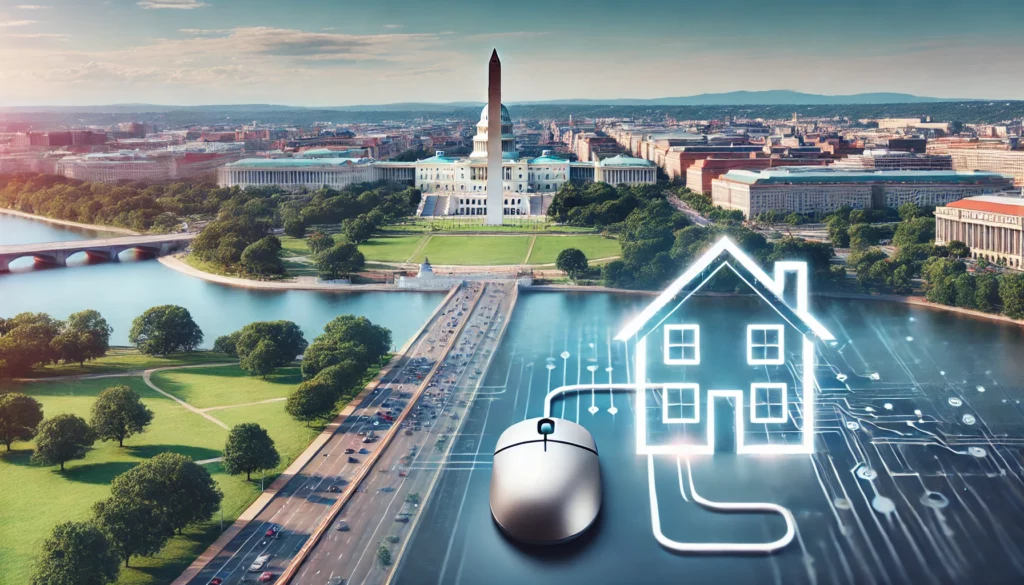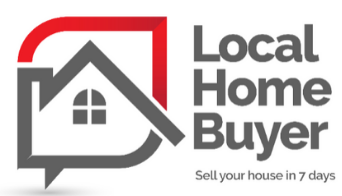Can You Sell a House Remotely in Washington DC?

Introduction
If you’re looking into the possibility of selling a house remotely in Washington, DC, you’re probably feeling overwhelmed with logistics, paperwork, and the general stress of managing a home sale from afar. Whether you’ve inherited a property, are relocating for a job, or are simply trying to get rid of a house that’s no longer serving you, you need clear, actionable answers to the specific concerns you have. You’re likely wondering if it’s even possible to sell a house remotely, what the best approach would be, and whether you can avoid the hassle of a traditional sale or dealing with a real estate agent.
You might also be thinking about how much it will cost, how long the process will take, and whether it’s better to sell your house to a cash buyer instead of going the conventional route. Navigating these questions can feel challenging without the right insights. This blog will explore all the factors you need to consider when selling a house remotely in Washington, DC, so you can make an informed decision. We’ll also walk you through the process of selling for cash and how this might be the best route for those looking for a quick, straightforward, and hassle-free sale.
Can You Sell a House Remotely in Washington DC?
If you’re considering selling a home remotely in Washington, DC, it’s entirely possible, but it requires understanding the unique challenges and solutions that come with managing a property sale from afar. This section will break down the essential aspects of selling a home remotely, from how to manage the sale without being physically present to understanding the advantages and disadvantages of remote home sales.
The Feasibility of Selling a House Remotely in Washington DC
Selling a house remotely in Washington, DC is not an unusual scenario, especially in today’s digital age. With modern technology and a variety of real estate options, it’s easier than ever to manage the process without having to physically visit the property. Whether you’re dealing with a long-distance move, an inherited property, or simply don’t want to deal with the hassle of traditional real estate processes, remote sales are a viable option.
However, while it is feasible, there are certain steps and tools that can help facilitate the process. First and foremost, you’ll need a reliable network of professionals who can handle the on-the-ground aspects of the sale. This could include a trusted real estate agent, a property manager, or even a cash buyer, depending on which route you choose to take. Using a combination of digital tools such as virtual tours, electronic signatures, and remote document handling is the most common method.
Despite the accessibility of remote sales, there are potential risks. For instance, without being physically present, you may miss out on critical details during home inspections or miss the opportunity to negotiate effectively. However, working with a cash buyer can streamline this process, as it removes much of the back-and-forth usually involved in a traditional sale.
How to Handle the Sale Process When Selling a House Remotely in Washington DC
Managing a property sale remotely requires staying organized and keeping track of every step, even though you won’t be physically present to oversee things. The sale process consists of several stages: getting your property evaluated, marketing it (if needed), handling offers, signing contracts, and eventually closing the sale. Here’s how you can handle each of these stages remotely.
Step 1: Get an Accurate Property Evaluation
To begin the sale, you’ll need an accurate valuation of your property. Typically, this would involve a real estate agent visiting the home to assess its condition, market value, and features. But how do you get an evaluation if you’re not in town?
Thankfully, technology makes this step more straightforward. A trusted agent or appraiser can conduct a virtual walkthrough via video call, helping them assess the home’s condition and estimate its value. Some buyers, like cash buyers, may also offer to send their own evaluators to assess the house on your behalf.
Additionally, many online platforms provide home valuation tools that give you an estimate based on similar properties in the area, recent sales data, and market conditions. While these tools aren’t as precise as an in-person evaluation, they can still give you a rough idea of what your home is worth. You can use tools like Zillow’s Home Value Estimator to get an estimate.
Step 2: Marketing the Property Remotely
If you plan to sell your home through a traditional sale, marketing is key to attracting potential buyers. This step can be handled remotely with the help of a skilled real estate agent. You can send them high-quality photos, videos, and virtual tours of the home to use in online listings.
If you’re selling your home as-is (for example, in need of repairs), you may want to focus on a quick sale with fewer showings, making it easier to handle the logistics remotely. If you’re considering a cash sale, you won’t need to worry much about traditional marketing, as the buyer typically already has their process in place.
Step 3: Handling Offers and Negotiations
Once your home is listed and you start receiving offers, you’ll need to decide whether to accept or negotiate. If you’re not in Washington, DC, this is where a trusted agent or even a lawyer can step in to negotiate on your behalf. If you’re working with a cash buyer, this step is often simplified, as cash buyers tend to offer more straightforward deals that require less negotiation.
Some buyers also offer an easy process where you can quickly sign offers electronically, which can further streamline the process if you’re managing everything from afar.
Step 4: Signing Contracts and Closing
Once you accept an offer, you’ll need to sign the contract and other necessary documents. This can be done remotely through e-signing platforms like DocuSign or Adobe Sign. These tools are secure and legally recognized, allowing you to sign contracts without ever needing to be physically present.
When it comes to closing, you may still have to travel to DC for the final signing, or you may be able to complete everything remotely with the help of your agent or title company.
Costs and Fees Involved in a Remote Home Sale
Like any home sale, selling remotely comes with its own set of costs and fees. Understanding these costs will help you make an informed decision about your sale strategy.
1. Real Estate Agent Fees
If you’re choosing to sell through a traditional route, the most significant cost is typically the real estate agent’s commission. In Washington, DC, real estate commissions usually range from 5% to 6% of the final sale price. For example, if you sell your home for $300,000, you may pay up to $18,000 in commission fees, which are split between the seller’s agent and the buyer’s agent.
2. Closing Costs
In Washington, DC, closing costs typically amount to around 2% to 5% of the home’s sale price. These costs include title insurance, transfer taxes, and other administrative fees. For a $300,000 home, closing costs could range from $6,000 to $15,000.
For more information on typical closing costs and fees when selling a house, take a look at this guide on closing costs from Redfin.
3. Repairs and Renovations
If your home requires repairs or renovations before selling, you’ll need to consider these costs. In a traditional sale, potential buyers may request repairs as part of their offer. As a remote seller, managing these repairs can be difficult unless you have a team in place locally to handle the work. Depending on the scope of repairs, these costs could range from a few hundred to several thousand dollars.
4. Cash Sale Benefits
Opting for a cash sale can significantly reduce costs and save you time. A cash buyer typically won’t require extensive inspections or negotiations, and the closing process is often faster and less complicated. Additionally, cash buyers often purchase homes as-is, so you won’t have to worry about costly repairs. In exchange for a quick, hassle-free sale, you may receive a slightly lower offer, but you’ll avoid many of the costs that come with a traditional sale.
If you’re considering a cash sale and need to sell quickly, take a look at our Relocating? Sell Your House Fast For Cash guide for a more detailed explanation of how the process works.
Advantages and Disadvantages of Selling a House Remotely in Washington DC
When selling your house remotely, there are several pros and cons to weigh before making your decision. Below, we’ll dive into both the advantages and disadvantages.
Advantages of Selling a House Remotely
- Convenience: The most obvious advantage is the ability to handle the sale without having to be physically present in Washington, DC. You can manage everything from the comfort of your current location, saving you time and money.
- Access to a Larger Pool of Buyers: Selling remotely allows you to connect with buyers who are not limited to the local market, especially if you’re using online platforms or working with a real estate agent who markets your property nationwide.
- Flexibility: Remote sales can offer greater flexibility in terms of timing and how you manage the sale. Whether you’re relocating or handling an estate, you can proceed with the sale according to your schedule.
Disadvantages of Selling a House Remotely
- Limited Control: Not being on-site means you may have limited control over how your home is marketed, the sale process, and negotiations. This can sometimes lead to missed opportunities or mistakes.
- Increased Costs: Managing a remote sale can incur extra costs, especially if you hire third-party services to handle inspections, repairs, and negotiations. These fees can add up quickly.
- Risk of Miscommunication: Without direct communication, there’s a higher risk of misunderstandings with potential buyers, real estate agents, and other parties involved in the sale.
Conclusion: Is Selling a House Remotely in Washington DC Right for You?
Selling a house remotely in Washington DC can be a viable option, but it’s essential to weigh the pros and cons before moving forward. While the process can be streamlined with the right tools and professionals, it still involves challenges such as managing remote negotiations, handling repairs, and dealing with the costs associated with traditional sales.
If you’re looking for the quickest, most straightforward way to sell, Local Home Buyer offers an excellent alternative. By selling your home for cash to Local Home Buyer, you eliminate many of the complexities and hidden costs of traditional sales. We buy homes as-is, without the need for repairs, and offer a fast, hassle-free closing process. Whether you’re relocating, handling an estate, or simply looking for a fast sale, Local Home Buyer can make the entire process smoother and faster, all while providing a fair and competitive cash offer.
If you’re ready to sell your house quickly and without the typical stress of remote sales, Local Home Buyer is here to help. Contact us today for a free, no-obligation cash offer and get the process started.
